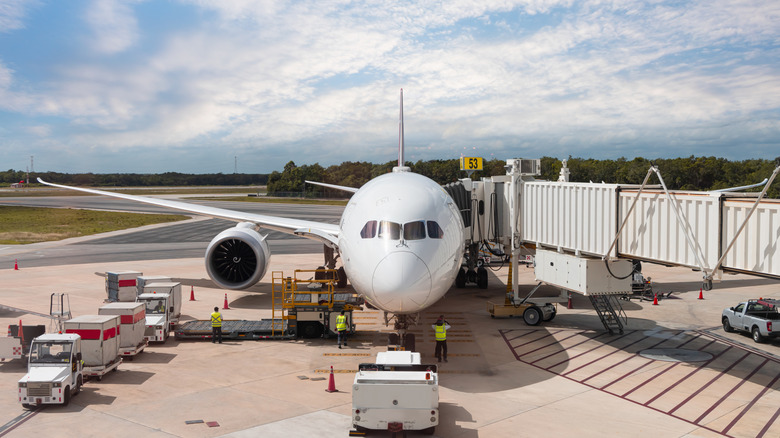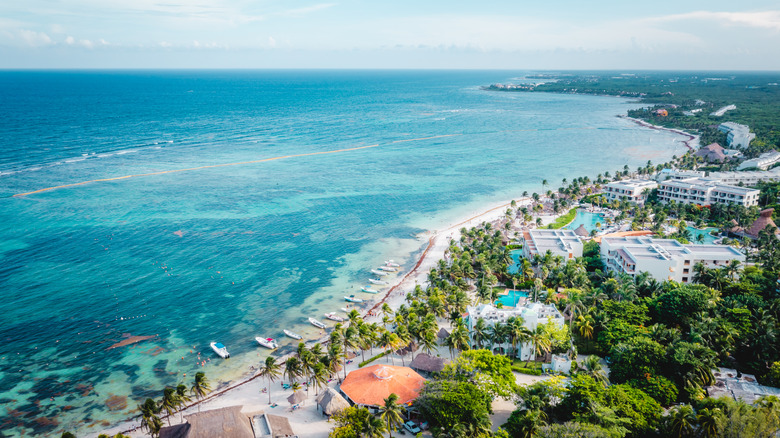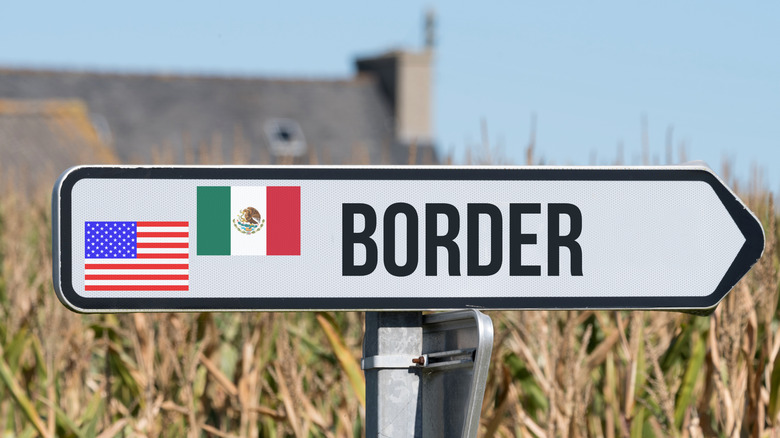This Beloved Mexican Vacation Spot Will Suck The Money Out Of Your Wallet
The new year might have you thinking about your vacation plans for the next 12 months. However, from air travel to rental cars to hotels to food, the costs of a family vacation can add up, and fast. Although certain locations are cheaper than others, it's worth paying attention to just how much inflation has increased overall travel, regardless of destination, in the post-pandemic economy. Chances are good you will end up paying more, sometimes a lot more, when traveling this year.
According to the Federal Reserve Bank of St. Louis, average airline fares in the U.S. have increased over 20% since 2020 (when comparing November 2020 to the same month in 2024). Plus, NerdWallet's December 2024 Travel Inflation Report found that the average travel costs (which includes airfare, car rentals, food away from home, hotels, and entertainment) in November were 4% higher than they were at the same time in 2023, and 14% higher than they were in 2019. All of this can combine to make certain destination locations fall outside of the average American's vacation budget. Similarly, increased costs have also made the idea of all-inclusive resorts and package deals more appealing than ever. With combined hotels, food, and sometimes even entertainment options on-site, all inclusive resorts can seem like an easier and more affordable way to vacation this year. When it comes to these kinds of resorts, perhaps no destination is more famous than Cancun, Mexico.
Cancun is more expensive than some other destinations
Despite the relaxing warm weather and seeming affordability of all-inclusive resorts, Cancun can end up costing you a significant amount of money. For starters, at a little over four hours from New York and almost five hours from Los Angeles, the flight to Cancun alone can be a significant financial outlay. However, perhaps the most deceptive (and sneaky) part of how quickly your expenses can add up in Cancun is that most all-inclusive resorts aren't as inclusive as you might think.
While access to the grounds (including pools and potentially beaches) are generally included, add-on activities like scuba diving, snorkeling, or even local whale-watching tours all cost additional money. According to USA Today scuba packages can cost upwards of $300 while whale watching can cost an extra $100. Plus, it's important to be aware of "free" excursion offerings since they often end up including equipment rental fees that can still cost you extra. Not to mention the "all-inclusive" label generally means you will pay more for your hotel every night, with more affordable all-inclusive resorts still costing around $250 a night. It's also important to pay attention to additional fees like resort fees and transient taxes which can add on to your nightly room rate. All of these add-ons and fees can add up to make your supposedly affordable all-inclusive vacation stretch way outside of your intended budget. As a refresher, don't spend more than 5% to 10% of your net annual income on a vacation.
2025 considerations
Beyond the financial outlay associated with a vacation to Cancun, political considerations could soon also be a significant factor when vacationing south of the border. In particular, the growing animosity between the U.S. and Mexico as a result of Donald Trump's proposed tariffs and undocumented immigration policies (which will negatively impact Social Security). Not only has Trump promised closed borders and mass deportations, but The New York Times also recently reported on how his advisers have spent months looking for a way to specifically invoke Title 42, which allows a President to declare a public health emergency. By claiming he was protecting the country from immigrants carrying a specific disease, Trump could successfully seal off the border with Mexico altogether, thereby fulfilling one of his campaign promises.
If a border closure does happen in 2025, it could severely impact travel itineraries depending on the level of closure. Another consideration is how this closed border could affect the economy of Mexico. While more relevant in Northern Mexico and border cities in which residents might commute to the U.S. for work, a closed border could lead to higher rates of unemployment in Mexico which could drive up poverty and even potentially more crime. It's worth mentioning that The U.S. Department of State has already previously issued travel advisories for those visiting Mexico due to crime, specifically violent crime, being more widespread in the country. Cancun, specifically, is located in the Mexican state of Quintana Roo which is currently categorized as level 2, meaning visitors should exercise increased caution.


